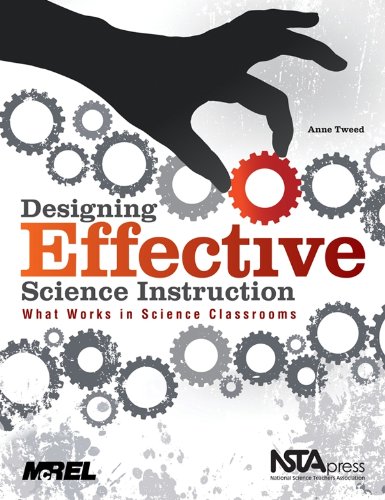Designing Effective Science Instruction What Works in Science Classrooms
Anne Tweed, a Principal Consultant with the Mid-continent Research for Education and Learning (McREL) in Denver, Colorado, also serves as the Associate director of the North Central Comprehensive Center, which serves a five-state region. Her work at McREL is research based and includes ongoing professional development workshops in the areas of assessment systems, effective science instruction, formative assessment, high-quality instructional practices, teaching reading in content areas, analyzing instructional materials and curricular audits. In her role as associate director of the North Central Comprehensive Center, she leads project activities that build the capacity of state education agencies through resource dissemination, group facilitation, building infrastructure and networking, planning and needs assessment, developing solutions that are part of statewide systems of support and revising tools and templates that support schools in need of improvement. Additionally, she is a co-principal investigator on an NSF DRK-12 project that supports implementation of nanoscale science and technology in secondary classrooms.Tweed is a past-president of the National Science Teachers Association (2004–2005). A veteran high school science educator and department coordinator, she spent the majority of her 30-year teaching career with the Cherry Creek School District in Colorado. Tweed earned an M.S. degree in botany from the University of Minnesota, a B.A. degree in biology from Colorado College, and a teaching certificate from the University of Colorado. In addition, Tweed chaired the life science program planning team revising the 2009 NAEP Framework for Science. Tweed has been recognized for her work in education and has received the Distinguished Service Award and the Distinguished High School Science Teaching Award from NSTA, and is a state Presidential Award honoree. She has published many articles, co-authored several books, and given more than 250 presentations and workshops at state and national conferences. ... Read more Read less
Science teachers, like all teachers, start each school year with high hopes and expectations for students to succeed. They plan their lessons, scramble to get the necessary equipment, and work hard to engage their students. However, despite good intentions and best-laid plans, not all students do well in science classes, and even fewer achieve mastery. Student performance on national and international assessments is poor, and/or more adults are unable to understand the scientific issues that affect their lives and society. Something must be done now to help science teachers put power behind their hopes and expectations for student achievement. Designing Effective Science Instruction helps you reflect on what is working well with your current approach to designing lessons and provides recommendations for improving existing lessons or creating effective new ones, all while exploring the characteristics of high-quality science lessons. Whether you are a novice or veteran teacher, the self assessments and suggestions in this book offer guidance that encourages you to refine what you do to become a more effective science teacher. Author Anne Tweed recommends a C-U-E framework—Content, Understanding, and Environment—demonstrating to teachers that all three elements must be part of lesson design and implementation to successfully achieve high-quality science instruction. Providing a review of the research related to each element, strategies to be incorporated into the lesson, and tools that assess teachers' practices, this book is also of value to principals and department heads, curriculum specialists, science mentors, professional development providers, and science education professors—anyone concerned with improving science education and nurturing effective teaching. ... Read more Read less











